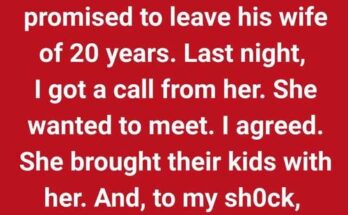My name is Lillian Carter, and I turned fifty-nine the year I married a man thirty-one years younger than me. His name was Ethan Ross, and when I first met him, I believed he was the calm after a storm I thought would never end.
We met in a yoga class in San Francisco, the kind that smelled of lavender and rain. I had just retired from teaching, my back ached, and my heart ached more. The silence of widowhood had begun to close in, and then there was Ethan — patient, gentle, and disarmingly kind. His voice had the steady tone of someone who made the world slow down.
When he smiled, it felt like light after years of gray.
A Love That Looked Perfect
From the beginning, people warned me.
“He’s too young.”
“He’s after your money.”
“You’re lonely, Lillian. Be careful.”
I told myself they didn’t understand. Yes, I had a comfortable inheritance — a townhouse in the city, savings, a small villa by the ocean. But Ethan never asked for any of it. Instead, he gave. He cooked meals that made the house smell alive again. He massaged my shoulders after long days, folded laundry, watered the plants.
And every night, he brought me a glass of warm water with honey and chamomile.
“Drink it all, sweetheart,” he’d whisper, pressing the glass into my hands. “It helps you sleep. I can’t rest unless you do.”
It became a ritual of tenderness, the small rhythm that closed every day. He called me his little wife, and though part of me laughed at the nickname, another part secretly loved how soft it sounded.
For six years, I believed in that warmth — believed I had found a love that didn’t need proving.
The Night I Couldn’t Sleep
One evening, Ethan told me he’d stay up late to make “herbal desserts” for some friends from his yoga studio. “Go to sleep first, baby,” he said, brushing my forehead with a kiss.
I nodded and turned off the light, but something deep inside refused to settle. It wasn’t fear exactly — just a quiet instinct whispering look again.
I slipped out of bed, bare feet silent against the hallway floor. From the doorway, I saw him at the kitchen counter. He poured warm water into my usual glass, opened a drawer, and pulled out a small amber bottle. He tilted it over the glass. One, two, three drops. Then he added honey, chamomile, stirred gently, and smiled — the same calm, careful smile I’d fallen in love with.
My chest tightened. My heart wanted to deny what my eyes had seen.
When he carried the glass upstairs, I was already back in bed, pretending to stir awake. He offered it with his usual affection.
“Here you go, baby girl.”
I took it, smiled faintly, and said, “I’ll finish it later.”
He kissed my hair and turned off the light. When his breathing finally deepened beside me, I poured the drink into a thermos, sealed it, and hid it in my closet.
The Results
The next morning, I drove to a private clinic and asked them to test the liquid. Two days later, a doctor sat across from me, hands folded.
“Mrs. Carter,” he said, “the sample you brought in contains a strong sedative. Taken regularly, it can cause memory loss and dependence. Whoever gave you this wasn’t helping you sleep — they were keeping you subdued.”
The world tilted. Six years of supposed love suddenly looked like something else entirely.
That night, I didn’t drink. I waited.
When Ethan saw the full glass on my nightstand, he frowned. “Why didn’t you finish your water?”
“I’m not sleepy tonight,” I said softly.
His voice stayed calm, but his eyes sharpened. “You’ll feel better if you drink it. Trust me.”
For the first time, I saw something hard behind the gentleness — a shadow that had been there all along.
The Confrontation
The next morning, after he left for work, I checked the kitchen drawer. The amber bottle was still there, half full, no label. My hands shook as I sealed it in a plastic bag and called my lawyer.
Within a week, my accounts were transferred, the locks changed, and a safety deposit box opened in my name alone.
That night, I told Ethan the truth.
“The doctor tested your tea,” I said evenly. “It’s filled with sedatives.”
For a moment, he looked at me — not surprised, not afraid, but disappointed, as though I had ruined something delicate.
“You don’t understand, Lillian,” he said softly. “You think too much, worry too much. I just wanted to help you relax… to keep you calm.”
“By drugging me?” I asked.
He shrugged, as if I’d exaggerated. “You were happier that way.”
That was the last night he ever spent in my home.
The Healing
The annulment came quickly. My lawyer handled what I couldn’t bear to read. The bottle was turned over to the authorities, the substance confirmed as an unprescribed sedative. Ethan vanished soon after — no forwarding address, no apologies, no explanations.
But the real work began after he left.
The nights were the hardest. I’d wake to silence, convinced I heard his footsteps or the clink of glass. Trust became something I had to rebuild piece by piece — in myself, not in anyone else.
Eventually, I sold the townhouse and moved permanently to the beach villa, where the ocean kept steady time for me. Mornings became sacred again. I’d walk barefoot along the sand with a cup of coffee, whispering to the waves, “Kindness without honesty isn’t love. Care without freedom is control.”
The Life After
Now, at sixty-two, I teach a small yoga class for women over fifty. It’s less about flexibility and more about strength — the kind you build when life breaks and you rebuild it yourself. We stretch, breathe, and talk about the art of staying open without surrendering your boundaries.
Sometimes, one of my students asks, “Do you still believe in love after all that?”
I smile and answer truthfully, “Yes, I do. But love isn’t what someone gives you — it’s what they never take away from you.”
Every night before bed, I still make myself a glass of warm water with honey and chamomile. Only now, I pour it myself.
I raise it to my reflection and whisper, “Here’s to the woman who finally woke up.”



